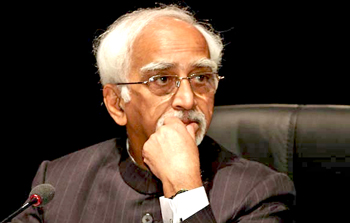
New Delhi, Jan 24: Vice President Hamid Ansari Saturday will lead the Indian government delegation at the funeral of king Abdullah Bin Abdul Aziz Al Saud who died early Friday.
The government has declared a day's mourning Saturday and flags are being flown at half-mast.
An official statement said "the government and people of India have received with deep sadness and shock" the news of King Abdullah Bin Abdul Aziz Al Saud who died of complications from pneumonia early Friday.
"India has maintained close and friendly relations with Saudi Arabia under the leadership of King Abdullah. These bonds have been especially strengthened by the presence of the large expatriate Indian community which has found a home in the Kingdom of Saudi Arabia," the statement added.
Ansari is a former Indian ambassador to Saudi Arabia.
President Pranab Mukherjee and Prime Minister Narendra Modi have sent messages of condolences to King Salman bin Abdul Aziz Al Saud, who has succeeded him.
The president said: "In his passing away, Saudi Arabia had lost a beloved leader, India a close friend and the world, an elder statesman."
"King Abdullah had genuine warmth and affection for India and our people. He was personally committed to improving bilateral ties with India," a statement from Rashtrapati Bhavan said.
Modi described the Saudi King as a guiding force, and said: "In King Abdullah, we have lost an important voice, who left a lasting impact on his country. I condole his demise.
"Our thoughts are with the people of Saudi Arabia, who have lost a guiding force in King Abdullah, during this hour of grief. A few days ago I spoke to Crown Prince Salman and enquired about King Abdullah's health. News of King Abdullah's passing away is saddening," he added.
India's energy security depends a lot on Saudi Arabia which accounts for 20 percent of the country's oil imports.
Kerala Chief Minister Oommen Chandy recalled the Saudi King as one who in general was considerate to Indians, particularly to Keralites.
He said he fondly recalls that during the period when Nitaqat (a Saudi government initiative to boost local employment) was in force in the oil-rich kingdom in 2013, it was through the King's intervention that many requests to the Saudi government were accepted
"Over the past many decades, Saudi Arabia has been home to lakhs of Keralites, who earn a living by working there and the departed's vision made this happen," Chandy said in a message.
According to a recent study on the diaspora by the Centre for Development Studies, out of the 2.36 million Kerala diaspora, 25.2 percent are in Saudi Arabia.





Comments
Add new comment